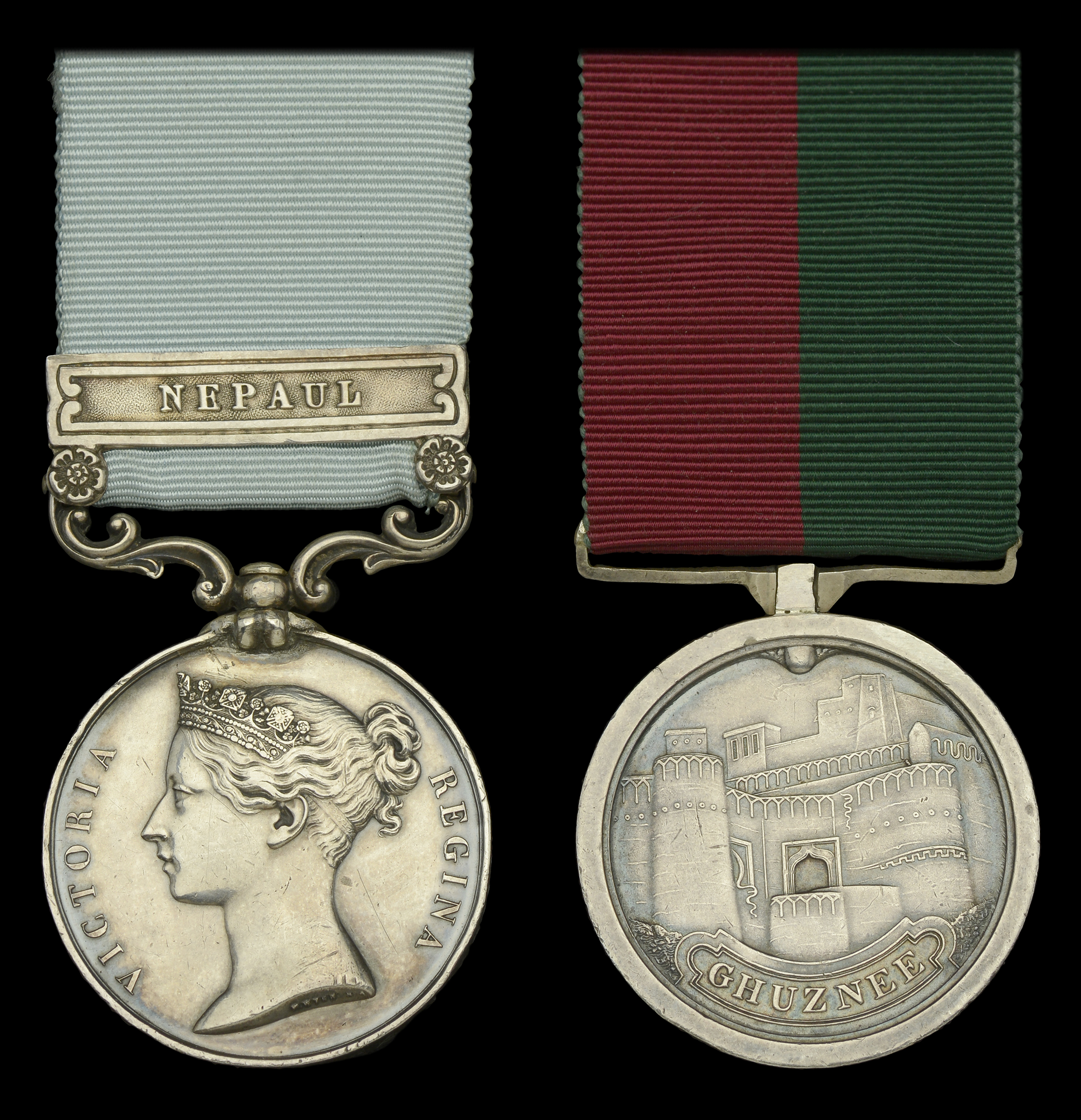Pair: Lieutenant-Colonel William Hough, Judge Advocate General of the Bengal Column, Army of the Indus, and author of A Narrative of the March and Operations of the Army of Indus in the Expedition to Afghanistan, 1838-1839, and several other works on Military Law Army of India 1799-1826, 1 clasp, Nepaul (Lieut. Wm. Hough, 8th Grenr. Battn.) short hyphen reverse, officially impressed naming; Ghuznee 1839 (Major W. Hough, Dy. Judge Advte. Genl.) neatly engraved on the edge, original suspension, good very fine (2) £1,800-£2,200 --- Provenance: Glendining’s, June 1988. William Hough was born in London in 1789 and obtained a Cadetship in the East India Company’s Army in 1805. He arrived in India on 11 July 1806, and was posted to the Barasat Cadet College, near Calcutta. He was commissioned as an Ensign in the 24th Bengal Native Infantry on 7 August 1806, whilst still at Barasat, and promoted to Lieutenant in the same regiment in October 1808. In 1816, as a Lieutenant and holding the appointments of Interpreter and Quartermaster to the 8th Grenadier Battalion of the Bengal Army, he accompanied the expedition under Sir David Ochterlony into the Kingdom of Nepaul to subdue the Nepalese who were making repeated raids into Indian territory, in spit of treaties of friendship with Britain and a sharp lesson taught them by the East India Company’s Army the previous year. He was promoted to Captain in the 48th Bengal Native Infantry in 1826 and a year later obtained the extra-regimental employment of Acting Deputy Judge Advocate General of the Cawnpore Division. For the rest of his working life he is associated with the legal branch of the Army, which was almost entirely occupied by the day to day Courts martial at various levels. As early as 1821 he had written the first of his many books on military law, one of which - A case book of European and Native Courts Martial - ran to some 900 pages. In 1839 came the beginning of what was perhaps Hough's finest enterprise when he was appointed Deputy Judge Advocate General to no less than the Bengal portion of The Army of the Indus. This vast force, comprised of two of the East India Company's Presidency armies, joined together to march across the desert to Afghanistan. There, as has been succinctly stated, they were ‘to persuade the Afghans to become a bulwark against Persia, and Russia by arranging for them to be conquered by their hated enemies, The Sikhs, it being optimistically supposed that they would be reconciled to this fate by the appearance of their former king, Shah Shoojah, whom most of them despised as a failure and whom all of them believed to have been born under an unlucky star.’ Many books and diaries exist of this war, which ended in the total annihilation of the remnants of both armies three years later on their ignominious retreat from Kabul, but none cover the march into Afghanistan and the capture of Ghuznee in more detail than Major Hough's epic The March and Operations of the Army of the Indus, which was published nearly simultaneously in Calcutta and London in 1841. In 1840 after the thus-far-victorious army had settled down in Kabul, Hough was recalled to Calcutta and placed on the Invalid Establishment List. He retired in February 1850 and returned to England. His busy pen produced several law books during the years after his return form Afghanistan. He also wrote anonymously the most comprehensive history of the Bengal Army ever to appear. Unfortunately it appeared in the Englishman newspaper in Calcutta, an instalment at a time over several years and was never republished in book form. He was promoted to Honorary Lieutenant-Colonel on 28 November 1854, and died in London on 3 January 1865, aged 75. Sold with research including a most interesting article by A. G. Stone, Esq., O.B.E., giving a very detailed account of the military career of Lieutenant-Colonel William Hough, together with a first edition of his Campaign in Afghanistan.
Auctioneer's Buyers Premium: 24% (+VAT)
There is an additional charge of 4.95% (+VAT/sales tax)
See Full Terms And Conditions


